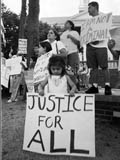In the United States and across the globe the color of a person’s skin can lead to power or discrimination, privilege or depravity, rights granted or rights oppressed. It can affect every part of the societal landscape, and in the year of a presidential election in the U.S., the political weight that exists with race is pushed further into view for everyone to analyze.
Four faculty members in UK’s Department of Political Science study race and politics. Collectively, their research examines a common theme across widely different areas of the political world: How does race influence contemporary politics?
 “It’s impossible to understand American politics without taking race into account,” said Professor Mark Peffley. “Fortunately, our department can do that in diverse ways that illuminate how deeply race influences politics both at home and abroad.”
“It’s impossible to understand American politics without taking race into account,” said Professor Mark Peffley. “Fortunately, our department can do that in diverse ways that illuminate how deeply race influences politics both at home and abroad.”
Stephen Voss’s research concerns how race and ethnicity shapes elections, both in terms of the political impact of racial and ethnic minorities on election outcomes and of how Whites react to the presence of those groups in the electorate.
Numerous economic, political, and cultural factors affect racial and ethnic relations and Voss’s work tries to distinguish among these different influences on electoral behavior using advanced statistical methods.
His current project (undertaken with two former UK graduate students) seeks to understand the influences on minority representation in Congress: Does the quality of representation depend on whether group members turn out to vote? Does voting help with group representation even if their candidate loses? If the group’s general popularity changes rapidly, as happened to Arab Americans after 9/11, does the benefit of voting also change?
 Horace Bartilow’s research examines race in international and comparative contexts. His 2007 article in Latin American Politics and Society with Charles Davis examines how Mexican citizens’ perceptions of racial discrimination against Mexican immigrants in the United States shaped their level of domestic support for NAFTA.
Horace Bartilow’s research examines race in international and comparative contexts. His 2007 article in Latin American Politics and Society with Charles Davis examines how Mexican citizens’ perceptions of racial discrimination against Mexican immigrants in the United States shaped their level of domestic support for NAFTA.
In a forthcoming article inInternational Studies Quarterly, Bartilow (with Voss) examines how cultural similarities in race and ethnicity lead states to trade more with each other. In fact, similarities in race and ethnicity each explained the level of trade between nations even when a slew of other factors (e.g., alliances, militarized disputes and the level of democracy among trading partners) are considered.
Richard Fording’s research focuses on how race influences poverty policy in the American states. In a forthcoming article in American Journal of Political Science, Fording and his co-authors point out how welfare policy making is increasingly decided by the states, localities and private firms.
Although some argue that these developments further the goals of innovation, efficiency, and responsiveness to local preferences, others argue that such developments are really designed to enhance social control over poor and minority populations faced with diminished opportunities and fewer social services. Fording and his co-authors find support for their theory of Racial Classification of how race influences social policy choices.
The Racial Classification model is extended in a series of additional papers which examine the implementation of welfare in Florida. Fording's research on racial politics also extends beyond welfare, and includes a recently published article in the Journal of Politics on racial disparities in state prison populations, and an ongoing project on the mobilization of white separatist groups.
Peffley’s research focuses on how race influences public attitudes toward welfare and crime policies, two ostensibly “race-neutral” issues that are intertwined with race in the public’s mind.
In a recent study published in the American Journal of Political Science, Peffley (and co-author Jon Hurwitz) used national survey data to see how Whites’ and Blacks’ support for the death penalty were affected by different arguments against capital punishment.
Peffley found that African-Americans are more responsive to argument frames that are both racial (i.e., the death penalty is unfair because most of the people who are executed are black) and nonracial (i.e., too many innocent people are being executed) than are whites, who are highly resistant to persuasion and actually become more supportive of the death penalty when confronted with the argument that it discriminates against blacks.
These polarized responses to the framing of arguments against the death penalty can be explained, in part, by the huge racial divide in the way Blacks and Whites view the fairness of the wider criminal justice system, with many Blacks viewing the system as riddled with racial discrimination, while many Whites think the system is colorblind and deny that any significant racial bias exists.
The racial divide in public views of the justice system is the topic of a book that Peffley and Hurwitz recently completed, Justice in America: Why Blacks and Whites See Separate Realities.
